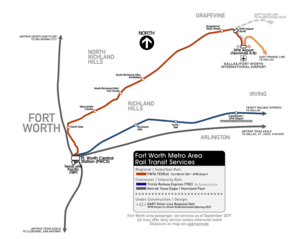TEXRail
TEXRail is a 27-mile (43 km) commuter rail line in Tarrant County, Texas, United States that provides service between downtown Fort Worth and DFW International Airport via Grapevine and other Tarrant County communities. It is operated by Trinity Metro (formerly Fort Worth Transportation Authority) and started service on January 10, 2019,[2] with a preview service having occurred on December 31, 2018.
 | |||||||||||||||||||||||||||||||||||||||||||||||||||||||||||||||||||||||||||||||||||||||||||||||||||||||||||||||||||||||||||||||||||||||||||||||||||||||||||||||||||||||||||||||||||||||||||||||||||||||||||||||||||||||||||||||||||||||||||||||||
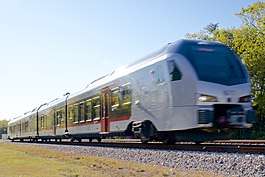 | |||||||||||||||||||||||||||||||||||||||||||||||||||||||||||||||||||||||||||||||||||||||||||||||||||||||||||||||||||||||||||||||||||||||||||||||||||||||||||||||||||||||||||||||||||||||||||||||||||||||||||||||||||||||||||||||||||||||||||||||||
| Overview | |||||||||||||||||||||||||||||||||||||||||||||||||||||||||||||||||||||||||||||||||||||||||||||||||||||||||||||||||||||||||||||||||||||||||||||||||||||||||||||||||||||||||||||||||||||||||||||||||||||||||||||||||||||||||||||||||||||||||||||||||
| Other name(s) | TEXRail | ||||||||||||||||||||||||||||||||||||||||||||||||||||||||||||||||||||||||||||||||||||||||||||||||||||||||||||||||||||||||||||||||||||||||||||||||||||||||||||||||||||||||||||||||||||||||||||||||||||||||||||||||||||||||||||||||||||||||||||||||
| Type | Commuter rail | ||||||||||||||||||||||||||||||||||||||||||||||||||||||||||||||||||||||||||||||||||||||||||||||||||||||||||||||||||||||||||||||||||||||||||||||||||||||||||||||||||||||||||||||||||||||||||||||||||||||||||||||||||||||||||||||||||||||||||||||||
| System | Trinity Metro (formerly Fort Worth Transportation Authority) | ||||||||||||||||||||||||||||||||||||||||||||||||||||||||||||||||||||||||||||||||||||||||||||||||||||||||||||||||||||||||||||||||||||||||||||||||||||||||||||||||||||||||||||||||||||||||||||||||||||||||||||||||||||||||||||||||||||||||||||||||
| Status | Operating | ||||||||||||||||||||||||||||||||||||||||||||||||||||||||||||||||||||||||||||||||||||||||||||||||||||||||||||||||||||||||||||||||||||||||||||||||||||||||||||||||||||||||||||||||||||||||||||||||||||||||||||||||||||||||||||||||||||||||||||||||
| Locale | Tarrant County Texas, USA | ||||||||||||||||||||||||||||||||||||||||||||||||||||||||||||||||||||||||||||||||||||||||||||||||||||||||||||||||||||||||||||||||||||||||||||||||||||||||||||||||||||||||||||||||||||||||||||||||||||||||||||||||||||||||||||||||||||||||||||||||
| Termini | T&P Station DFW Airport Station | ||||||||||||||||||||||||||||||||||||||||||||||||||||||||||||||||||||||||||||||||||||||||||||||||||||||||||||||||||||||||||||||||||||||||||||||||||||||||||||||||||||||||||||||||||||||||||||||||||||||||||||||||||||||||||||||||||||||||||||||||
| Stations | 9 | ||||||||||||||||||||||||||||||||||||||||||||||||||||||||||||||||||||||||||||||||||||||||||||||||||||||||||||||||||||||||||||||||||||||||||||||||||||||||||||||||||||||||||||||||||||||||||||||||||||||||||||||||||||||||||||||||||||||||||||||||
| Services | 1 | ||||||||||||||||||||||||||||||||||||||||||||||||||||||||||||||||||||||||||||||||||||||||||||||||||||||||||||||||||||||||||||||||||||||||||||||||||||||||||||||||||||||||||||||||||||||||||||||||||||||||||||||||||||||||||||||||||||||||||||||||
| Daily ridership | 1,900 (Q1 2019)[1] | ||||||||||||||||||||||||||||||||||||||||||||||||||||||||||||||||||||||||||||||||||||||||||||||||||||||||||||||||||||||||||||||||||||||||||||||||||||||||||||||||||||||||||||||||||||||||||||||||||||||||||||||||||||||||||||||||||||||||||||||||
| Website | https://ridetrinitymetro.org/texrail/ | ||||||||||||||||||||||||||||||||||||||||||||||||||||||||||||||||||||||||||||||||||||||||||||||||||||||||||||||||||||||||||||||||||||||||||||||||||||||||||||||||||||||||||||||||||||||||||||||||||||||||||||||||||||||||||||||||||||||||||||||||
| Operation | |||||||||||||||||||||||||||||||||||||||||||||||||||||||||||||||||||||||||||||||||||||||||||||||||||||||||||||||||||||||||||||||||||||||||||||||||||||||||||||||||||||||||||||||||||||||||||||||||||||||||||||||||||||||||||||||||||||||||||||||||
| Opened | December 31, 2018 (preview) January 10, 2019 (full service) | ||||||||||||||||||||||||||||||||||||||||||||||||||||||||||||||||||||||||||||||||||||||||||||||||||||||||||||||||||||||||||||||||||||||||||||||||||||||||||||||||||||||||||||||||||||||||||||||||||||||||||||||||||||||||||||||||||||||||||||||||
| Owner | Trinity Metro | ||||||||||||||||||||||||||||||||||||||||||||||||||||||||||||||||||||||||||||||||||||||||||||||||||||||||||||||||||||||||||||||||||||||||||||||||||||||||||||||||||||||||||||||||||||||||||||||||||||||||||||||||||||||||||||||||||||||||||||||||
| Operator(s) | Trinity Metro | ||||||||||||||||||||||||||||||||||||||||||||||||||||||||||||||||||||||||||||||||||||||||||||||||||||||||||||||||||||||||||||||||||||||||||||||||||||||||||||||||||||||||||||||||||||||||||||||||||||||||||||||||||||||||||||||||||||||||||||||||
| Rolling stock | 8 Stadler FLIRT | ||||||||||||||||||||||||||||||||||||||||||||||||||||||||||||||||||||||||||||||||||||||||||||||||||||||||||||||||||||||||||||||||||||||||||||||||||||||||||||||||||||||||||||||||||||||||||||||||||||||||||||||||||||||||||||||||||||||||||||||||
| Technical | |||||||||||||||||||||||||||||||||||||||||||||||||||||||||||||||||||||||||||||||||||||||||||||||||||||||||||||||||||||||||||||||||||||||||||||||||||||||||||||||||||||||||||||||||||||||||||||||||||||||||||||||||||||||||||||||||||||||||||||||||
| Line length | 27.2 mi (43.8 km) | ||||||||||||||||||||||||||||||||||||||||||||||||||||||||||||||||||||||||||||||||||||||||||||||||||||||||||||||||||||||||||||||||||||||||||||||||||||||||||||||||||||||||||||||||||||||||||||||||||||||||||||||||||||||||||||||||||||||||||||||||
| Track gauge | 4 ft 8 1⁄2 in (1,435 mm) standard gauge | ||||||||||||||||||||||||||||||||||||||||||||||||||||||||||||||||||||||||||||||||||||||||||||||||||||||||||||||||||||||||||||||||||||||||||||||||||||||||||||||||||||||||||||||||||||||||||||||||||||||||||||||||||||||||||||||||||||||||||||||||
| Operating speed | Up to 70 mph (110 km/h) | ||||||||||||||||||||||||||||||||||||||||||||||||||||||||||||||||||||||||||||||||||||||||||||||||||||||||||||||||||||||||||||||||||||||||||||||||||||||||||||||||||||||||||||||||||||||||||||||||||||||||||||||||||||||||||||||||||||||||||||||||
| |||||||||||||||||||||||||||||||||||||||||||||||||||||||||||||||||||||||||||||||||||||||||||||||||||||||||||||||||||||||||||||||||||||||||||||||||||||||||||||||||||||||||||||||||||||||||||||||||||||||||||||||||||||||||||||||||||||||||||||||||
The new line is worth $1 billion.[3] This segment of the Cotton Belt Rail Line is operated independent of the other segments, as it was built by Trinity Metro, instead of DART, who will be building the Silver Line to the east.[4]
Officials with Trinity Metro are hoping the new rail line will entice non-member cities along the line to join the transit agency in its quest to become a regional transit entity. Cities along the route include Colleyville, Haltom City and North Richland Hills. The route also goes through small parts of Hurst and Southlake. Unlike Grapevine, those cities do not have room under the state-mandated 8.25% sales tax cap for the 1⁄2¢ needed to join. Trinity Metro will not build a station along the line in those cities unless they become a member city first.
History
Grapevine citizens voted 8,058-2,898 on November 7, 2006 to levy a full cent sales tax, of which three-eights of a cent would authorize Grapevine to contract with Trinity Metro for rail service and another 1/8 cent for other transit improvements, like a downtown parking garage.[5] This includes an expansion of the commuter rail system to link southwest Fort Worth to the north end of DFW International Airport.
Trinity Metro's Board of Directors finalized their plans in October 2006 for the southwest-to-northeast expansion. Two commuter routes, a light rail route and a bus rapid transit route were under consideration. The Board's recommendation was a commuter rail line that runs in the southwest part of the city near Sycamore School Road, running near Texas Christian University and the Medical District on its way to the existing T&P Station and Fort Worth Central Station. At that point it turns northwest toward the Stockyards before turning northeast toward DFW International Airport. Preliminary plans call for nine new stations with eleven total,[6] and could be contingent on other cities along the corridor joining the agency.
A proposal to use private funding to construct both TEXRail and DART's Dallas County segment was considered, but this plan was abandoned after necessary legislation was not passed in the State Legislature.[7] Following this legislative defeat, Trinity Metro began pursuing federal grant funds in order to build TEXRail.[7] On March 5, 2014, it was announced that the TEXRail project would receive $50 million in federal grant funds from President Barack Obama's 2015 New Starts Funding Budget.[8]
In April 2015, Trinity Metro approved a contract for pre-construction services, awarded to an Archer Western Contractors/Herzog Contracting Corp (Archer Western Herzog) a joint venture, as well as approving the final design for the Iron Horse and Smithfield Road stations.[9]
On June 9, 2015, Trinity Metro ordered an initial eight Stadler Rail 4-car articulated FLIRT3 (Fast Light Innovative Regional Train) DMUs.[9] The contract was valued at $106.7 million, with an option for up to 24 additional DMUs, and includes the supply of components for 10 years. This is Switzerland-based Stadler's first order in the US for any model outside its Stadler GTW product line, therefore making it subject to the regulations of the Buy America Act. As such, one element of the contract is that the final assembly of the trains will take place in the US, at their plant in Salt Lake City.[10][11][12]
That same month, the Federal Transit Administration (FTA) gave approval for the project to advance into the engineering phase that immediately precedes the start of construction.[13] In June 2016, Trinity Metro received a Letter of No Prejudice from the FTA, essentially green-lighting the project. In reaction to this, Trinity Metro said they planned to start preliminary construction in July 2016, on track for a planned opening date in December 2018.[14] DFW Airport also said they would provide the $40 million to build the station at Terminal B, with an opening date in late 2018.[15]
Construction on the line officially started on August 24, 2016, with a groundbreaking held at Grapevine's historic depot, the site of Grapevine-Main Street station.[16]
On January 4, 2019, less than 12 hours before service was scheduled to commence, the opening was suspended due to signal issues identified during an inspection by Federal Railroad Administration officials along the southern end of the line in Downtown Fort Worth.[17] The new opening took place on January 10, 2019.[18]
Future expansion
Scott Mahaffey, Trinity Metro board chairman, has expressed interest in extending the line south and adding two stations to serve the medical district and Texas Christian University at an estimated additional cost of $200 million. This extension could be completed by 2023, when all additional planned and proposed stations are added the line will be an additional 14 miles longer. City Councilman Jungus Jordan has said that he would like to see the line go even farther south to serve Tarleton State University's new campus near the Chisholm Trail Parkway.[19]
Operations
Estimated travel time from T&P Station to DFW International Airport is estimated to be approximately 52 minutes.[20] There are 48 trips per day with predominantly 1-hour headways; all but the earliest westbound and latest eastbound trains runs the full length of the route.[21]
The line is predominantly single tracked, with passing sidings installed to allow for 30-minute headways.[22]
Stations
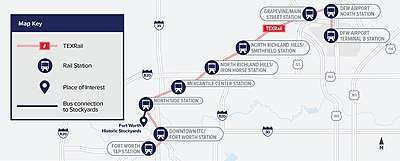
Stations were opened on December 31, 2018:[23]
spaces | |||
|---|---|---|---|
| Texas & Pacific (T&P) | Fort Worth | 350 | |
| Fort Worth Central Station | 0 | ||
| North Side | 164 | ||
| Mercantile Center | 318 | ||
| N. Richland Hills/Iron Horse | North Richland Hills | 376 | |
| N. Richland Hills/Smithfield | 559 | ||
| Grapevine-Main Street | Grapevine Vintage Railroad | Grapevine | 137 |
| DFW Airport North | Future: DART Silver Line | 208 | |
| DFW Airport/Terminal B | (via walkway to DFW Airport station) Future: DART Silver Line |
Grapevine | 0 |
Rolling stock
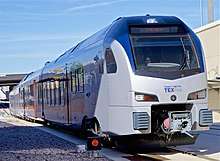
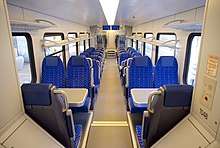
Trinity Metro provides TEXRail service using 8 Stadler FLIRT self-propelled diesel multiple units (DMU) capable of seating 229 passengers and carrying up to 488 passengers.[23][20] In TEXRail application, the diesel power module contains two 520-kilowatt (697 hp) (1400 hp Total) Deutz AG TCD 16.0 V8 engines that comply with US EPA Tier 4 emission standard, able to achieve a top speed of 81 mph (130 km/h). These units at 266 feet (81 m) long weigh in at 352,000 pounds (160 t) empty (443,000 pounds (201 t) full load).[24]
The contract to purchase eight trainsets, valued at about $100 million, was awarded to Stadler in June 2015.[24] The first set was delivered in October 2017,[25] and four more sets had arrived by November 2018.[26] Equipment testing and crew training started in March 2018.[27]
Each rail vehicle is configured with an operator cab at either end for bidirectional movement. At the center of the train is the power pack with two diesel engines, with a passageway to allow access to other parts of the train, and allows it to be much quieter than traditional commuter rail. TEXRail vehicle amenities include USB ports equipped at every seat, work tables, lap trays, a quiet car, ADA compliant level boarding, overhead luggage racks, bike racks, and a restroom near the center of each train.[28][20]
References
- "TRANSIT RIDERSHIP REPORT: First Quarter 2019" (PDF). APTA. American Public Transportation Association. Retrieved August 15, 2019.
- Campbell, Elizabeth (August 16, 2018). "This commuter rail service is more than a way for passengers to get to DFW Airport". Star-Telegram. Retrieved August 17, 2018.
- Dickson, Gordon (June 17, 2016). "TEX Rail on track to open in 2018 despite lack of federal funds". Fort Worth Star-Telegram. Retrieved August 2, 2018.
- "DART.org - Cotton Belt Regional Rail Corridor Information". www.dart.org. Retrieved January 8, 2019.
- Grapevine election results
- Archived March 25, 2009, at the Wayback Machine
- Dickson, Gordon (May 29, 2013). "Cotton Belt funding bill dies in Legislature". Fort Worth Star-Telegram. Retrieved April 13, 2014.
- "TEX Rail Plan Gets $50-Million In Federal Funds". CBSDFW.com. March 5, 2014. Retrieved August 13, 2014.
- "TEX Rail contracts approved". Trains Magazine. April 28, 2015. Retrieved April 29, 2015.
- "TEX Rail orders Stadler Flirt DMUs". Railway Gazette. June 11, 2015.
- "Stadler Rail wins 100-million-dollar contract in Texas". Stadler Rail. June 10, 2015. Archived from the original on June 21, 2015.
- Location of Stadler manufacturing plant. http://www.sltrib.com/news/business/2017/10/13/stadler-breaks-ground-on-railcar-manufacturing-plant-expected-to-employ-1000-in-west-salt-lake-city/
- "TEX Rail receives FTA approval to enter engineering phase". Railway Track & Structures (RTS). Simmons-Boardman Publishing. June 5, 2015.
- "TEX Rail Set To Become Reality, But…". CBS DFW. June 28, 2016.
- "D/FW Airport Approves TEX Rail Station at Terminal B". NBC DFW. July 1, 2016.
- "Finally, TEX Rail project underway from Fort Worth to Grapevine and DFW". Star-Telegram (Fort Worth). Retrieved August 25, 2016.
- Leszcynski, Ray (January 4, 2019). "TEXRail calls off Saturday's planned debut after signal issue stalls federal clearance". Dallas Morning News. Retrieved January 7, 2019.
- Ladner, Darren (January 7, 2019). "TEXRail Passenger Service". Trinity Metro. Retrieved January 8, 2019.
- Dickson, Gordon (January 18, 2019). "Fort Worth is crazy over TEXRail, so is now the time to extend the trains south and west?". Fort Worth Star-Telegram. Retrieved March 18, 2019.
- "Vehicles". Overview - TEXRail. Trinity Metro. Retrieved August 2, 2018.
- "TEXRail Schedules". Trinity Metro. Retrieved December 20, 2018.
- "Appendix B: Operations and Maintenance Plan" (PDF). DART. DART. Retrieved December 18, 2018.
- "TEX Rail Diesel Multiple Unit Train Sets RFP 14-T008" (PDF). The T. June 30, 2014. Archived from the original (PDF) on August 14, 2014. Retrieved August 13, 2014.
- "Stadler unveils TEX Rail Flirt DMU". Railway Gazette International. October 10, 2017. Retrieved December 28, 2018.
- "Why TEX Rail commuter train cars may be safer than older models". Star-Telegram. November 10, 2017. Retrieved December 28, 2018.
- "New TEXRail Train Tests Continue Before Service Launch". NBCDFW.com. November 6, 2018. Retrieved December 28, 2018.
- "$105 million Grapevine Main on track to be the coolest place in Texas to catch a train". Star-Telegram. March 7, 2018. Retrieved December 28, 2018.
- Starcic, Janna (February 14, 2018). "Fort Worth 'FLIRTs' with New Train Tech for Airport Link". Fort Worth 'FLIRTs' with New Train Tech for Airport Link. METRO Magazine. Retrieved August 2, 2018.
